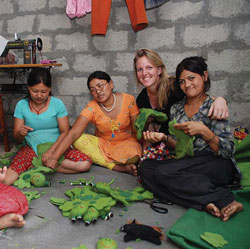The Power of Sisterhood
 |
Taking part in her ninth trip to Nepal, Australian Development worker, Stephanie Wollard is moving mountains in the name of fair trade and women. The driving force behind the not- for- profit organization Seven Women, Stephanie Wollard has dedicated her career in development to teaching disabled women valuable skills to better their lives. Inspired by one of her first trips to Nepal, where she encountered seven women making handicrafts in a tin shed, she developed Seven Women with the intention of selling their products in Australia. Today Seven Women has provided jobs and training to over 100 disabled Nepali women while a training skills center has been erected where the tin shed the women worked from them once stood, as part of a partnership with the Fair Trade Group ESPA Nepal. Through fundraising initiatives the women have been able to take part in a number of courses, including a three-month embroidery course funded by The World Bank. In many cases Seven Women has been a catalyst for change in many women's lives, improving their self-esteem and giving them a place to share their stories. Yet the skills they have learnt are of the most value giving them the chance to lift themselves out of poverty. According to Wollard, many of the women who work at the centre and take part in the training faced harsh conditions and social stigmas within their own villages. The opportunities Seven Women has given them have not only changed their lives but the lives of their families. "Working for a fair wage has enabled the women to be economically empowered. In the first year of the centre when they were being trained and learning how to make new designs," she said. "Once the women were producing better quality goods we changed the wage system to a piece by piece basis system which allowed many to earn more. This has allowed them to pay for their children to go to school and in some cases- their husband's medical bills." One such person is 17 year old Ram Maya Amagi. Born with a deformity that hindered her speech, she was unable to speak and was referred to as 'semi-dumb.' As result of her work at with Wollard and ESPA Nepal she was offered the medical treatment she needed to speak properly after a hospital read of her disability. Today Amagi believes one of her biggest achievements so far is learning to speak better than she ever could. "When I met these women, I wanted to work with them to create change. So that they could live lives they enjoyed rather than just survive," Wollard said. The process has not been an easy one for women who have faced such discrimination they doubt their abilities. The progress towards producing quality goods was slow, while in the first years Wollard paid to have goods imported to Australia hoping that with training, the women would improve the quality of their work. As a result of Wollard's persistence many of the women are now aiming to train others, hoping that they too can help women like themselves. Some are even looking to develop their own businesses, a hopeful outcome for the sustainability of the Seven Women initiative. Stephanie adds, "Being a foreigner and working in a different culture is not an easy task. There have been many challenges and lessons along the way… and I speak Nepali. I am very pleased at how successful the project has become. A lot of hard work has gone into it. "
(This article is taken from http://www.wavemag.com.np/issue/article3976.html in which we were featured. By Brittany Searle, April 2012)
